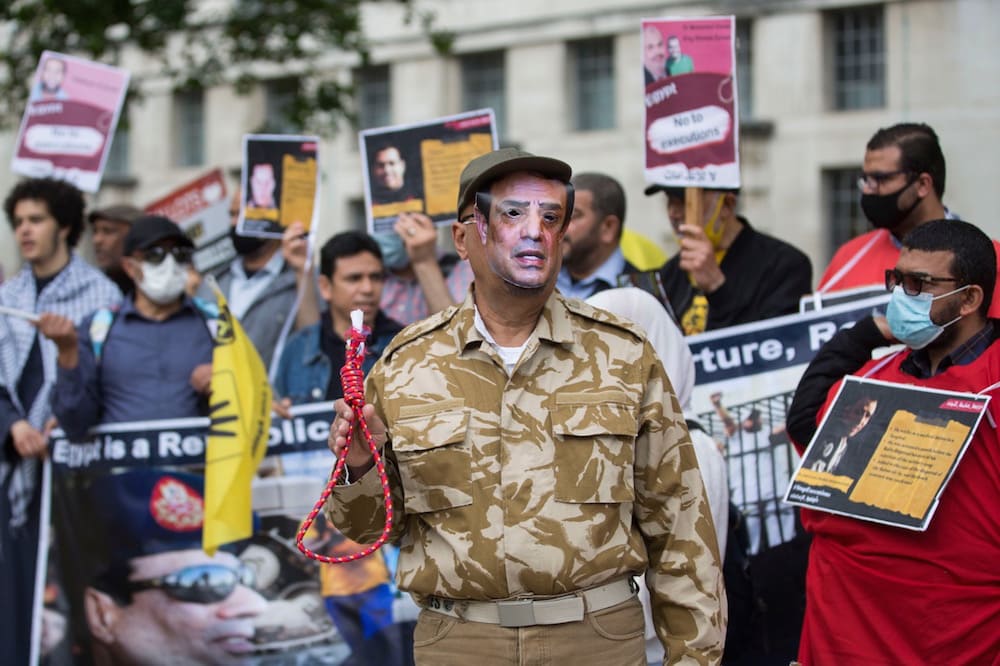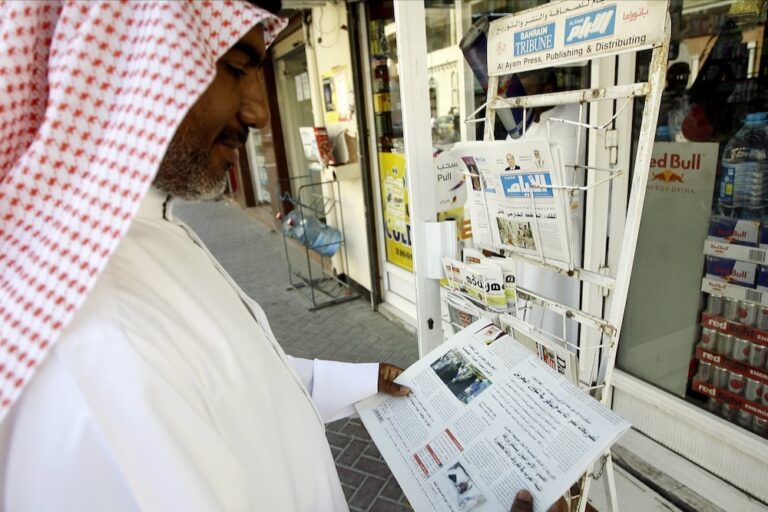June 2021 in Middle East and North Africa: A free expression roundup produced by IFEX's Regional Editor Naseem Tarawnah, based on IFEX member reports and news from the region.
Egypt’s judiciary becomes a tool of state repression, Palestinian protesters targeted by ‘thugs’ and teargas, Iran’s new President signifies country’s impunity crisis, and the human rights community pays tribute to Emirati human rights defender Alaa Al-Siddiq.
Egypt: Judicial persecutions and weaponized terrorism laws
Attacks on independent media and civil society organizations continue unabated. Founding executive director of the Egyptian Initiative for Personal Rights (EIPR) and prominent human rights defender Hossam Bahgat faces a third case being brought against him in what rights groups say is likely continued prosecution and harassment of EIPR staff.
Journalists Hisham Fouad and Hossam Moanis remain behind bars without trial since 25 June 2019. Accused of “participating in a terrorist group and spreading false news on social media with the aim of inciting sedition and overthrowing the regime”, their pretrial detentions have been renewed over 25 times, spurring rights groups from around the region and world, including 25 IFEX members, to call for their immediate release.
Haneen Hossam, Mawada Eladhm, and three other women social media influencers were sentenced to up to ten years in prison for their content on TikTok and Likee. Rights groups like the Cairo Institute for Human Rights Studies (CIHRS) called the flawed rulings and the persecution of women content creators part of a wider “systematic security and media campaign aimed at imposing moral and societal guardianship on social media users.”
In a joint statement, 64 rights groups from around the world called on President Abdel Fattah al-Sisi to immediately end the ongoing crackdown on freedom of association, independent groups, and peaceful dissent. Highlighting the work of UN experts, the groups condemned the arbitrary arrest, detention and judicial harassment of journalists, activists, researchers and human rights defenders, including Mahienour al-Massry, Mohamed al-Baqer, and founder and CIHRS director Bahey Eldin Hassan.
The statement called for an end to the arbitrary arrests and prosecutions against LGBTQI+ people and gendered attacks on women human rights defenders and social media influencers that have fuelled pervasive sexual and gender-based violence even within the justice system. The statement also called for a moratorium on executions and for amending counter-terrorism laws used to silence critics. Recent weeks have seen authorities carry out a frenzy of mass executions in an alarming increased use of the death penalty to target political opponents.
An online event held on the sidelines of the 47th Session of the United Nations Human Rights Council (UNHRC) brought together Egyptian human rights defenders and UN experts to highlight the abuse of counter terrorism laws in Egypt to target activists and human rights defenders who have increasingly been placed on “terrorism lists” and arbitrarily detained on trumped-up terrorism charges.
This includes Ramy Shaath, the Egyptian-Palestinian human rights defender and founder of Egypt’s branch of the Boycott, Divestment and Sanctions (BDS) movement, who has been imprisoned for over two years for “aiding a terrorist entity”. “So far we have not been told nor provided any evidence on why Ramy is detained on terrorism charges,” said Shaath’s wife Céline Lebrun during the UNHRC event.
Palestine: ‘Thugs’, teargas, and resistance
The abduction of activist and free speech advocate Nizar Banat by Palestinian security agencies, and his subsequent death while in custody, sent shockwaves throughout the Palestinian rights community. Thousands of peaceful demonstrators took to the streets in Ramallah and throughout the occupied territories to protest Banat’s killing and demand accountability. An outspoken critic of the Palestinian Authority (PA), Banat was seen as a potential contender in parliamentary elections earlier this year before they were abruptly cancelled by President Mahmoud Abbas.
Palestinian authorities employed a barrage of tools to violently crackdown on the mass protests, including tear gas and ‘thugs’ loyal to the PA to target protesters and journalists. Palestinian women were particularly targeted through brutal violence, arbitrary arrests, and being threatened with the publication of their private messages and photos taken from their stolen phones.
The Palestinian Journalists Syndicate called it “a new and dangerous development in the context of attacks on freedom of the press” in Palestine. Quds News Network reporter Najlaa Zeitoun described being physically and verbally attacked and threatened with rape during a protest in the West Bank. When Zeitoun informed her assailant she was a reporter, he replied: “I don’t give a damn.”
Michelle Bachelet, the UN high commissioner for human rights, called on the PA to immediately end any gender-based targeting, harassment, threats or violence against women protesters and journalists, and to “ensure the safety and security of all without discrimination.”
Palestinian demonstrations against Israel’s continued efforts to forcibly displace Palestinians from their homes in occupied East Jerusalem were also met with violent suppression by Israeli forces. Journalists reporting on the ongoing destruction of Palestinian residential and commercial buildings by Israeli authorities faced assaults and arbitrary detentions.
In its recent Index of Racism report, the Arab Center for the Advancement of Social Media (7amleh) documented a staggering 15-fold increase in violent online speech against Palestinians and Arabs during recent events, compared to the same time period in 2020. The report findings identified 183,000 online conversations that expressed racism, insults or incitement against Arabs out of 1,090,000 monitored conversations addressing Arabs and Palestinians generally on the internet, with Twitter standing out as the most “violent” platform in terms of violent speech, hosting around 85% of such content.
Supporting these findings, a recent report by IFEX-member I’lam Arab Center for Media Freedom Development and Research found that Facebook and Twitter represent the two most prominent social media platforms providing space for inciting and racist online speech against Arabs and Palestinians to thrive. The report monitored content published on pages of Israeli politicians and media professionals, showing Facebook and Twitter being responsible for 32% and 28% of hate and violent speech online, respectively.
In the midst of this encompassing repression, Palestinian art has played a prominent role as a tool and outlet for creative resistance, with myriad works of music, graffiti and online activism shedding light on the Palestinian struggle.
Impunity and Internet disruptions in Iran
With a heinous record of human rights violations, the victory of Iran’s judiciary chief Ebrahim Raisi in a flawed presidential election demonstrates the country’s unabated human rights crisis and endemic impunity.
The regime prevented media workers from covering the 18 June election freely, summoning and threatening dozens of journalists and citizen-journalists for their online posts. While rights groups and members of the #KeepItOn coalition called on authorities to ensure open and secure internet access ahead of the election, Iran’s online sphere is also being threatened by a new draft bill targeting social media platforms and banning virtual private network software that many Iranians rely on to bypass internet restrictions.
Meanwhile, UN special rapporteur on the human rights situation in Iran, Javaid Rehman, said he had enough evidence to justify opening an international investigation into Raisi’s role in the mass execution of thousands of political prisoners in 1988, including hundreds of journalists, when he served as a prosecutor.
In Brief
Bahrain: Political prisoner Husain Barakat died after contracting COVID-19 in Jau Prison, sparking outrage amid reports that prison authorities failed to provide adequate medical care. Families of detained prisoners of conscience have led a growing series of peaceful protests in recent weeks as authorities have failed to address the dire prison conditions that have been susceptible to coronavirus outbreaks.
Iraqi Kurdistan: Over the past year, authorities in Iraqi Kurdistan have ruthlessly cracked down on journalists, activists and protesters exercising their right to freedom of expression, including arbitrarily arresting and forcibly disappearing them, says a new Amnesty International report. Recent weeks have proven particularly repressive for journalists in the region. Freelance journalist Omed Baroshky received a one-year prison sentence for improper use of his media device, while photojournalist Qaraman Shukri was handed a seven-year sentence in a secret trial. An Iraqi Kurdistan court also upheld for the second time the sentences of five activists and journalists who participated in or covered anti-government protests.
Lebanon: Frustrations are boiling over as the country’s economic and political turmoil continue to rapidly deteriorate. Recent weeks saw demonstrations and a nationwide strike to protest the economic crisis and entrenched political corruption, as well as citizens storming central bank offices in protest of the country’s plunging currency. Two British and German journalists were kidnapped and briefly detained by Hezbollah.
Saudi Arabia: Two prominent Saudi women human rights defenders, Nassima Al-Sadah and Samar Badawi, were released from prison last month. According to the Gulf Centre for Human Rights, both activists are now “prohibited from working in the field of human rights, publishing on social media, getting a job, or travelling outside Saudi Arabia.” Meanwhile, Saudi authorities executed Mustafa Hashem al-Darwish for participating in protests when he was 17 years old. Saudi Arabia’s crown prince, Mohammed bin Salman, who is implicated for his role in the horrific murder of journalist Jamal Khashoggi, became one of the latest entrants on RSF’s “predators of press freedoms” list for his repressive methods that have included spying, abduction, detentions, and torture.
“Asylum is hard on a journalist whose homeland lives in his heart,” said Yemeni journalist Nabil Alosaidi in an interview with the Committee to Protect Journalists on the struggles displaced and exiled media workers in Yemen continue to face.
New & Noteworthy
The human rights community mourned the sudden passing of prominent Emirati human rights defender and Executive Director of the UK-based ALQST, Alaa Al-Siddiq, 33, who died in a tragic car accident in the UK where she had been living in exile since 2019. Al-Siddiq was a tireless champion for prisoners of conscience throughout the region, especially in the UAE where her father, Emirati poet and human rights defender Sheikh Mohammed Abdul Razzaq Al-Siddiq, is serving a 10-year sentence following an infamous 2013 show-trial against 94 political dissidents, known as the UAE94. Rights groups paid tribute to Al-Siddiq, and called for an investigation into her death.
On the first anniversary of Egyptian LBGTQI+ rights activist Sarah Hegazi’s death, and in memory of her life, activists from the LBGTQI+ community declared 13 June as “MENA Lesbian and Queer Women’s Pride Day” – an annual celebration of Hegazi’s life, and an expression of solidarity for the wider community.
Dozens of rights groups, activists, journalists, and artists launched the #StopSilencingPalestine campaign to demand an end to Facebook’s censorship of Palestinian voices. The campaign comes amidst an onslaught of violations against Palestinian digital rights in recent weeks, with 7amleh documenting hundreds of content takedowns by the social media giant.
A new coalition of rights groups have joined together to combat the growing threat of digital surveillance at the hands of repressive governments in the region that have increasingly deployed various digital surveillance technologies to monitor and silence critics. The coalition advocates for an end to the sale of surveillance tools, and for a safe and open internet for the region’s netizens.



